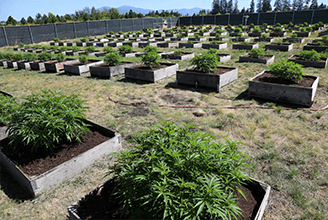Many people from the older generations grew up in the era of “reefer madness,” where marijuana was portrayed as an inherently evil, life-destroying drug. Even with the legalization of marijuana in some countries, this opinion still stands strong due to decades of propaganda and opposition. But older generations, whose beliefs may be rooted firmly in the stigma of their times, could be among those who benefit the most from medical marijuana.
Modern research is finding all kinds of extraordinary evidence of the efficacy of marijuana for many health conditions. While it is generally accepted as helpful for such things as anxiety and cancer, studies on using cannabis for dementia are currently underway. Since it’s possible to buy medical marijuana in Canada, this could be potentially life-changing research for many older Canadians.
What is Dementia?
Dementia is a general term that describes the deterioration of the brain and its ability to function properly. Memory loss, confusion, difficulty with problem-solving, and language loss are the most common signs. While many of these symptoms are normal signs of ageing, dementia is not. It occurs after damage has been done to brain cells that then interferes with their ability to communicate and leads to the symptoms mentioned above.
Dementia is most commonly caused by Alzheimer’s disease (a degenerative disease that accounts for 60-80% of dementia cases), but also includes vascular dementia (mini strokes, or brain bleeds, that lead to cell death) and other progressive brain diseases.
What are the symptoms of dementia?
Since dementia is an inclusive term for many ailments, pegging it down can be a challenge. In general, symptoms include:
- Decline or loss of short-term memory
- Difficulty remembering words or names
- Inability to remember daily life tasks (appointments, paying bills, etc.)
- Mood changes or irrationality
- Behavioural changes (agitation, shouting, losing things, etc.)
- Aggression or even violence
Dementia is typically progressive, meaning the symptoms worsen over time. Risk factors for dementia include age and genetics, which are both unchangeable. However, a healthy diet and active lifestyle can help postpone the onset.
Marijuana and the Brain
The human brain is a marvellously complex organ. Therefore it’s ailments are difficult to untangle. Yet research involving the brain and medical marijuana is proving the two to be quite harmonious.
Within the human body is the endocannabinoid system, which regulates the body’s responses to basic cognitive and physiological processes (memory, mood, appetite, pain-sensing, etc.). It does so by producing endocannabinoids, which are very similar to the cannabinoids found in marijuana.
Marijuana has two major compounds, tetrahydrocannabinol (THC) and cannabidiol (CBD). Both of these cannabinoids blend almost seamlessly with the endocannabinoids produced by the body, therefore enhancing the body’s ability to regulate many of the above-mentioned processes. CBD, in particular, is known to have neuroprotective effects, including inhibiting progressive neurological diseases.
Because of these known neuroprotective effects, scientists have theorized that cannabis may be applicable for protecting the brain from long-term deterioration caused by the various forms of dementia.
Marijuana and Dementia
To say it straight, the current position of the Alzheimer’s Society of Canada is “[w]hile there is ongoing promising research on the effects of cannabis, there is currently no evidence that cannabis is useful for the treatment or prevention of Alzheimer’s disease.” However, the fact that they used the word ‘promising’ is promising in itself.
Currently, the greatest hindrance in cannabis studies regarding dementia and other neurological disorders is a lack of organized data. Research is being conducted, but methodological issues are in the way of drawing reliable conclusions.
While a doctor won’t quite yet recommend that elderly citizens buy medical marijuana in Canada, some dementia symptoms have been shown to be helped by cannabis products.
Agitation, aggression, and even violence are some of the most challenging behaviours for family members to manage. These behaviour changes often result in the person suffering from dementia being put in a home for professional care. The medical community is beginning to accept that THC is helpful for these particular symptoms by regulating energy output and brain activity. Clinical trials are ongoing to confirm these findings
Non-human Studies
Human trials are lengthy in nature and complicated to control. Dementia patients need to be studied over the course of a decade or more, so results can be painstakingly slow to acquire. Scientists have turned to testing the effects of THC on mice, and with astounding results. While some disagree with animal testing, mice in one particular study seem to be benefiting greatly from consistent doses of synthetic THC.
The test mice, who are in the late stages of their lives, are steadily administered a tiny dose of synthetic THC over the course of a month. Then they are tested against their non-medicated counterparts in problem-solving skills.
The results show that the slightly stoned mice have significantly more mental capacity for recall (memory), learning, and socializing than the non-medicated control mice. Not only that, but experiments have also shown that older mice who have lost some of their cognitive abilities can actually gain them back when given microdoses of THC.
So, how is this applicable to humans?
Many medications that are tested on mice don’t necessarily translate to human application. Marijuana, on the other hand, has thousands of years of history in human culture. Unlike other prescription drugs, it is known to be mostly benign in terms of long-term negative effects on the human body.
It is multi-fold in its application, covering a variety of ailments with limited side effects. If marijuana can be proven useful for dementia, it could change the lives of tens of millions of people around the world.
Things to Keep In Mind about Dementia and Cannabis
Talking about dementia involves talking about the elderly. Elders deserve our respect and our care, so it’s imperative to be mindful of any recommendations. Before you offer your grandpa a tasty little edible or a spoonful of CBD honey for his cup of tea, remember that marijuana can have negative effects on memory, balance, and alertness.
These effects may be counterproductive in trying to protect those already suffering from a loss of brain capacity. A poorly judged dose could contribute to an accident and, therefore, a decrease in quality of life.
Ageing brains need all the help they can get, especially if they begin to suffer from the effects of dementia. If it seems like the right fit for the patient, talk with their healthcare provider. Buying medical marijuana in Canada for specific dementia symptoms that cannabis is known to help with, like agitation, aggression, or difficulties sleeping, may be just the helping hand an elderly brain needs.







